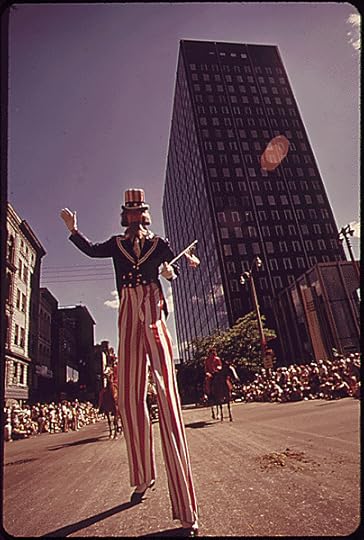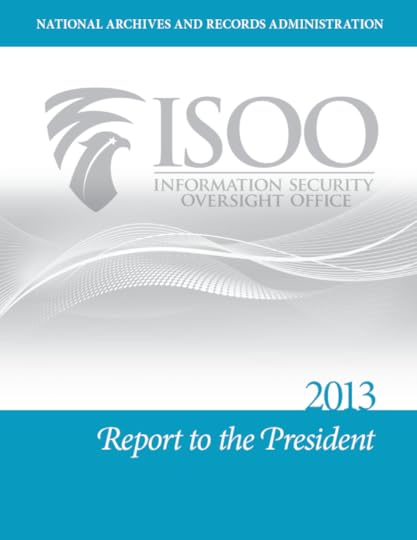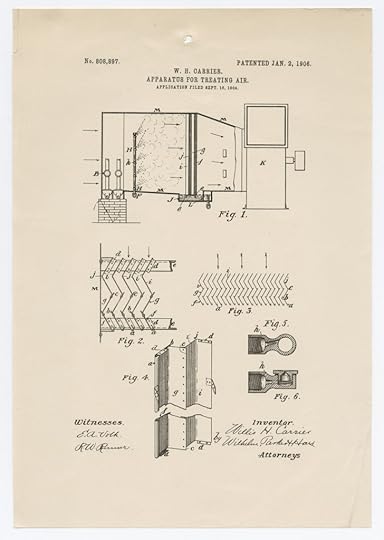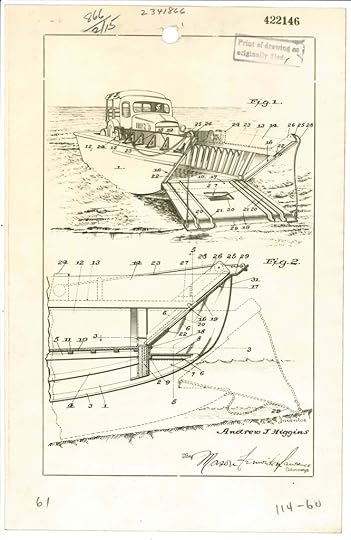David S. Ferriero's Blog, page 25
August 22, 2014
Happy Birthday, Annie Oakley!
Letter to William McKinley offering to raise a troop of 50 lady sharpshooters to fight the Spanish American War. They would provide their own rifles and ammunition. Unfortunately, women were not allowed to serve at that point in our history.
Letter to President William McKinley from Annie Oakley. April 5, 1898. National Archives Identifier 300369… [ Read all ]

August 18, 2014
Special Visitors
Tracy Bray contacted us recently and wondered if she could bring her father and family for a special visit to the National Archives in Washington. It was a surprise for her father, Harry Edward Neal Jr. The documents have special meaning to all of us and especially to the Neal family. Mr. Neal’s father, Harry Edward Neal, was the Secret Service Agent in charge of getting those precious parchments into protective custody at Fort Knox during World War II.
Photo of Harry Edward Neal
The Charters had not yet been transferred to the National Archives and were housed at the Library of Congress. Other documents slated for this secret mission included The Gutenberg Bible, Lincoln’s Second Inaugural and Gettysburg Addresses, and the Lincoln Cathedral copy of the Magna Carta which had been on display at the 1939 World’s Fair in New York City.
Agent Neal’s detailed report to Frank J. Wilson, Chief of the Secret Service, is fascinating. An armored truck “under suitable guard” moved the material from the Library of Congress Annex to Union Station where a drawing room and adjoining compartments on the Baltimore and Ohio Railroad train leaving at 6:30 p.m. on the 26th of December 1941.
A wonderful letter from then Librarian of Congress, Archibald MacLeish, captured the emotion of the moment in his letter of thanks to Henry Morgenthau, … [ Read all ]

August 13, 2014
My Afternoon with Bacall
As the Director of the New York Public Libraries I once had the opportunity to spend an afternoon with Lauren Bacall to pitch the NYPL Library for the Performing Arts at Lincoln Center as the repository for her papers. Accompanying Bob Taylor, then Chief of the Theatre Collection at LPA, we visited her at her home in The Dakota. To this day, I am torn about which was more exciting—meeting Bacall or being in The Dakota!
Actress Lauren Bacall sits atop a piano while Vice President Harry S. Truman plays the piano at the National Press Club Canteen. They are at the canteen to entertain the servicemen. February 10, 1945.
Series: Photographs Relating to the Administration, Family, and Personal Life of Harry S. Truman, 1957-2004, NARA ID 198606.
Overlooking Central Park, we sat in her bookcase lined living room, discussing her career and family and her collection. The bookcases were filled with leather bound volumes—one each for every play, movie, or performance of her life! Each volume contained an annotated script, newspaper reviews, Playbill, etc. Her collection was so well organized that it was an archivist/librarian’s dream! Bob was eloquent in pitching LPA as the appropriate place for the collection given her attitudes about Los Angeles and how New York had become so important to her life. I remember pitching the contribution to scholarship that the … [ Read all ]

August 1, 2014
The Hill Staff
Last night the Young Founder’s Society (YFS) hosted a reception in the Gold Room of the Rayburn House Office Building. The YFS is a membership group for young professionals in the Washington, DC, area who are committed to the work of the Foundation for the National Archives to increase awareness of the cultural and historical value of the National Archives.

Young Founder’s Society event invitation
While the event was part of the YSF’s membership drive, it was an opportunity for me to thank the attendees for their service to the nation and to single out the members of our oversight appropriations committees for special thanks. In my 14 hearing appearances to date (but, who’s counting?!) I have been impressed with the knowledge, expertise, and passion which these people bring to their job.
Many of the attendees have visited the National Archives with their Senator or Representative and to a person have left here inspired by the history they have relived through the original records. To simulate that experience last night several dozen facsimiles were around the room—the 1868 treasury note for $7.2m with which purchased Alaska, the First Continental Congress’ Agreement of Secrecy signed in 1775 to protect the Founders, the bus diagram showing where Civil Rights icon Rosa Parks was seated on that fateful day, and my letter to President Eisenhower asking for a … [ Read all ]

July 21, 2014
ISOO Report to the President
The Information Security Oversight Office (ISOO), established in 1978, is responsible to the President for overseeing the Government-wide security classification program, and receives policy and program guidance from the National Security Council. ISOO has been part of the National Archives and Records Administration since 1995. You can learn more about ISOO at www.archives.gov/isoo
The 34th Annual Report to the President covering 2013 was released earlier this month.
Several positive developments are noted in this report:
The number of persons granted original classification authority continues to decrease and is at its lowest recorded level, standing at 2,269.
Agencies reported a 20% reduction in original classification activity
ISOO conducted on-site reviews of five agency declassification programs with all agencies receiving a passing score.
Other report highlights:
Agencies reported 58,794 original classification decisions
Executive Branch agencies reported 80,124,389 derivative classification decisions
Under automatic, systematic, and discretionary declassification review, agencies reviewed 56,332,029 pages and declassified 27,524,342 pages of historically valuable records.
I am proud of the work of our ISOO staff and encourage you to become familiar with this important function here at the National Archives.… [ Read all ]

July 18, 2014
Patent of the Month: Apparatus for Treating Air
Stay cool out there this summer!
Apparatus for Treating Air – Willis H. Carrier, 09/1904 – 01/02/1906. National Archives Identifier 7268013

July 15, 2014
The Elusive 600
I’m loving Joseph McCormack’s new book, Brief: Make a Bigger Impact by Saying Less. The focus is on lean communication. McCormack terms it Six Sigma for your mouth! “In our attention deficit economy, being brief is what’s desperately needed and rarely delivered.”
People speak at about 150 words per minute, but we have the mental capacity to deal with 750 words per minute. That leaves a space of 600 words where we drift—think other thoughts, take a mini-vacation, lose focus, etc.
Military Photographer of the Year Winner 1997. Title: Thoughts Elsewhere.
Major Kurt Tek daydreams while coming home from a deployment, 01/01/1997.
National Archives Identifier 6498091
McCormack’s tips for clear, concise, and compelling oral presentations are simple: map it, tell it, talk it, and show it. Outline your remarks—background, relevance, information to impart, conclusion, and follow-up anticipating expected questions. Use narrative storytelling to deliver the message. Use a controlled conversation rather than a monologue. And use visuals to increase engagement. Most importantly, stop talking and give people a chance to process. “The mind is a processor, and if you keep hitting the send button, the effect can be maddening and futile.”
I was especially taken with his advice on avoiding TL/DR (too long, didn’t read) on email messages:
Make it Inviting—a strong subject line
Limit to One Screen
Embrace the White Space—instead of 8-10 sentence … [ Read all ]

July 3, 2014
Happy Fourth of July!
238 years ago, the Continental Congress adopted the Declaration of Independence. And John Adams envisioned future celebrations of the event. In a letter to his wife, he wrote: “It ought to be commemorated, as the Day of Deliverance by solemn acts of Devotion to God Almighty. It out to be solemnized with Pomp and Parade, with Shews, Games, Sports, Guns, Bells, Bonfires and Illuminations from one End of this Continent to the other from this Time forward for ever more.”

A Stilt-Walking “Uncle Sam,” 06/1973. National Archives Identifier
549573
That vision of the future got off to a slow, but no less passionate start. On July 5th 1777, John Adams wrote to his daughter from Philadelphia describing events of the first anniversary: Invited to dine with President Washington aboard the frigate Delaware, Adams wrote: “…we were saluted with a discharge of thirteen guns, which was followed by thirteen others, from each other armed vessel in the river; then the gallies followed the fire, and after them the guard boats. The President and company were saluted with three cheers, from every ship, galley, and boat in the river. The wharves and shores, were lined with a vast concourse of people, all shouting and huzzaing, in a manner which gave great joy to every friend to this country, and the utmost terror and dismay … [ Read all ]

June 30, 2014
The Allure of the Archives
Arlette Farge, Director of Research in Modern History at the Centre National de la Recherche Scientifique in Paris, has written a wonderful little book about doing research in archives.
“Contact with the archives begins with simple tasks, one of which is handling the documents. Combing through the archives—a beautifully evocative term—requires a host of tasks, and no matter how complex the planned intellectual investigation will be, they cannot be bypassed. They are both familiar and simple, and they purify one’s thoughts, temper the spirit of sophistication, and sharpen one’s curiosity. These tasks are performed without haste, and necessarily so. One cannot overstate how slow work in the archives is, and how this slowness of hands and thought can be the source of creativity. But more than inspirational, it is inescapable. The consultation of these bundles, one after another, is never finished. No matter how carefully you prepare beforehand, sampling documents and putting together research guides in an effort to limit the number of texts you will have to consult, your patience will inevitably be tested.”
Archivist Matt Law reviews Chinese Exclusion Act Files.; Location: National Archives at Riverside, Perris, CA; Photographer: Joseph S. Peñaranda
“Reading patiently, in silence, you will regularly run up against various obstacles as your eyes travel across the manuscript pages. Many documents have deteriorated physically, and torn corners or … [ Read all ]

June 6, 2014
Patent of the Month: Higgins boats
Today marks the 70th Anniversary of the D-Day invasion. To commemorate this anniversary, this month’s patent is Andrew Higgins’s landing boat. It is dated February 15, 1944, less than four months before D-Day.
LCVPs–or Higgins boats, as they are now commonly known –transported troops from the 1st Infantry onto Omaha Beach. They could each carry 36 combat-equipped infantrymen or 8,000 pounds of cargo. In all, 23,398 Higgins boats were produced during the war.
From the holdings of the National Archives at Kansas City, “Lighter for Mechanized Equipment,” Patent Case Files, 1836-1993, NAID 302050… [ Read all ]

David S. Ferriero's Blog













